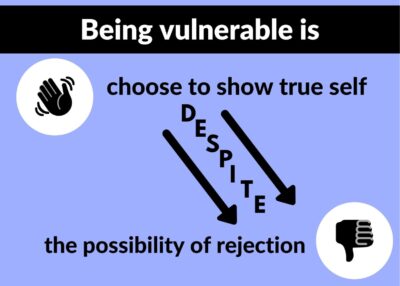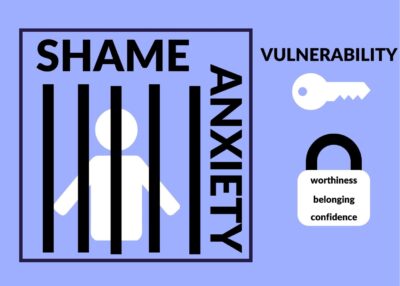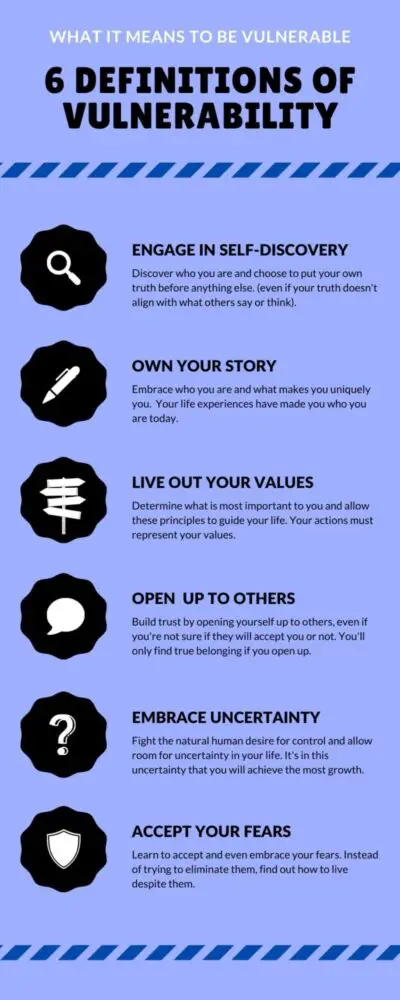What Does It Mean to Be Vulnerable?
The word “vulnerable” is often used synonymously with “weakness.” This definition might be right for engineering, but it’s not accurate when it comes to emotional vulnerability. A much better synonym for “vulnerability” is “courage.”
Emotional vulnerability can be defined as having the courage to take emotional risks, even when we don’t know the outcome. It means showing up as our authentic selves and speaking our truth with no guarantee that we’ll be accepted.
For many of us, this uncertainty invokes our deep-rooted fear of rejection. Humans are wired with a need for belonging, and avoiding rejection is a powerful motivator. As a result, we often try to fit in or hide our true feelings rather than risk not being accepted.
In the end, being emotionally vulnerable is not just helpful. It’s necessary to live a happy, fulfilled life.
Of course, that doesn’t mean it’s easy.
.
What It Means to Be Vulnerable
Vulnerable definition: to choose to be authentic and show our true selves, despite facing fear and uncertainty that what we say, do, or feel will be rejected.
As a teacher, I continuously observe my teenage students trying to navigate the confusing high school world. Not only are they discovering themselves, but they’re also learning what their peers will accept.
This process (amplified by hormones) encompasses every decision they make: what they wear, who they hang out with, how they talk. There are a lot of emotions, but fear is perhaps the most pervasive one. Every time they approach a choice, questions race through their minds. Is this who I want to be? Will I be accepted for it? What happens if people don’t like me?
Most of us survived (and perhaps crushed) this high school experience. That being said, these fear-motivated questions didn’t go away; they merely transformed. The decisions we make to be our true selves have evolved past wardrobes to things like values and relationships. Our life is no longer defined by how we behave in the cafeteria, but how we act and treat each other in our daily lives.
Being vulnerable means choosing to be true to yourself for small-scale acts, such as daily interactions, and large-scale acts, such as life choices.
The Search for Our True Self is Vulnerable
All of us, always, are searching for the self-awareness to discover our true selves. In part, this is because it’s terribly difficult to be self-aware (and there are a lot of things working against us).
Being emotionally vulnerable means that you are willing to engage in this self-discovery pursuit. It means asking yourself the hard questions and learning to accept the answers, even if they don’t align with what society says.
And then, after you begin to discover who it is you want to be? You’re willing to live it, every day, in the choices and actions you take – even if you’re afraid to.
.
[/fusion_text][fusion_code]PGRpdiBjbGFzcz0iaW50ZXJhY3RfcmVzcG9uc2l2ZV9wYWRkaW5nIiBzdHlsZT0icGFkZGluZzoxMDAlIDAgMCAwO3Bvc2l0aW9uOnJlbGF0aXZlO21hcmdpbi1ib3R0b206NXB4OyI+PGRpdiBjbGFzcz0iaW50ZXJhY3RfcmVzcG9uc2l2ZV93cmFwcGVyIiBzdHlsZT0iaGVpZ2h0OjEwMCU7bGVmdDowO3Bvc2l0aW9uOmFic29sdXRlO3RvcDowO3dpZHRoOjEwMCU7Ij48aWZyYW1lIGlkPSJpbnRlcmFjdEFwcDVmOGM0ZjU1YTRlMjA3MDAxNGQwOWJmZiIgd2lkdGg9IjEwMCUiIGhlaWdodD0iMTAwJSIgc3R5bGU9ImJvcmRlcjpub25lO21heC13aWR0aDoxMDAlO21hcmdpbjowOyIgYWxsb3dUcmFuc3BhcmVuY3k9InRydWUiIGZyYW1lYm9yZGVyPSIwIiBzcmM9Imh0dHBzOi8vcXVpei50cnlpbnRlcmFjdC5jb20vIy81ZjhjNGY1NWE0ZTIwNzAwMTRkMDliZmYvcS8xP21ldGhvZD1pZnJhbWUiPjwvaWZyYW1lPjwvZGl2PjwvZGl2Pg==[/fusion_code][fusion_text columns=”” column_min_width=”” column_spacing=”” rule_style=”default” rule_size=”” rule_color=”” content_alignment_medium=”” content_alignment_small=”” content_alignment=”” hide_on_mobile=”small-visibility,medium-visibility,large-visibility” sticky_display=”normal,sticky” class=”” id=”” font_size=”” fusion_font_family_text_font=”” fusion_font_variant_text_font=”” line_height=”” letter_spacing=”” text_color=”” animation_type=”” animation_direction=”left” animation_speed=”0.3″ animation_offset=””]
.
Why We Shy Away from Vulnerability
If being self-aware and living your authentic self sounds great so far… that’s because it is. But there’s a big gap between what sounds good and what we actually do (I’m talking about Grand Canyon-size gap). This discrepancy is not always our fault, either. It’s really hard to be vulnerable.
We’re working with some outdated technology in today’s modern world (and I’m not referring to your iPhone 7). Our brains are still functioning based on evolutionary DNA. The most fundamental parts of our brain are driven by two things: our emotions and our survival instincts. Unfortunately, both have a tendency to make us shy away from being emotionally vulnerable.
Our fear of not belonging often convinces us to hide our true selves, because we’re terrified of rejection. We’re social creatures, and at one point, our survival depended on belonging in social groups. While our daily decisions aren’t life-or-death, our bodies sometimes think that they are.
If you’ve ever felt your heart start racing or your armpits start sweating, you’ve experienced how your body reacts to this fear. You also might have experienced a wave of emotional backlash after being vulnerable. (Also known as a vulnerability hangover.)
The Role of Shame and Anxiety
Shame plays a significant role in what it means to be vulnerable, as well. When we are rejected, we feel a deep sense of shame. This can be amplified by low self-confidence, lack of social support, or previous traumas. Shame is rooted in an underlying belief that we are not worthy.
Shame often results in anxiety, which also holds us back from being vulnerable. Those same questions from my high school example race through our minds (and, as we get older, often evolve to more complex scenarios… how fun!). In our imagination, we don’t want to risk realizing that we’re not worthy.
Unfortunately, we fail to recognize the most crucial element in our subconscious avoidance of fear and shame. Worthiness is inherent, and vulnerability lets us feel it.
.
6 Definitions of What It Means to Vulnerable
Don’t be intimidated by the immenseness of what it means to be vulnerable. It’s not something that you can perfect overnight. In fact, part of being vulnerable means allowing yourself the time and patience to practice vulnerability. Below are six definitions of what it means to be vulnerable.
1. Engaging in self-discovery
Being emotionally vulnerable means presenting your most authentic self. You can’t do this, however, until you discover who that is. Choosing to embark on your own self-discovery journey is perhaps the most critical step you can take in living a vulnerable life. In doing so, you are willing to put your own truth before everything else.
Why is this vulnerable? Because everything in us is screaming to fit in, avoid shame and rejection, and stay safe. When I ask myself deep questions, I’m taking a risk that I won’t necessarily like the answers. Furthermore, my answers might not fit in with the beliefs of my family, friends, or society – which can be incredibly challenging.
I must also face my personal demons and flaws (which isn’t fun for anybody). Self-discovery is filled with moments of revelation. With every new discovery, I’ve got to make the hard choice to shed my previous thoughts. This growth is not for the weak-hearted, and it requires enormous vulnerability.
.
2. Owning your story
Every single person has a unique story that is exclusive to them. Unfortunately, in our social comparison, we devalue our own stories based on what we compare them to. It becomes a paradoxical search to both be special and to fit in. This often results in hiding aspects of our identity, dismissing past events, or devaluing things that are important to us.
Being vulnerable means owning your story, no matter how beautiful or ugly it may be. Your life experiences have taken you to this point in your life, and there’s no going back. Once you accept this fact, you can turn your attention to building your future.
Emotional vulnerability will also help you take on the leading role in your own story. Rather than letting fear dictate your actions, you can take control of your own life.
.
3. Living out your values
Another aspect of being vulnerable is living out your values. It’s not enough to discover what is important to you (although this self-discovery is noble in its own right). You must learn how to live these values through your actions.
Every decision we make should be rooted in our values. This might prove to be incredibly difficult; there are a million temptations every day that will give us an easier option. Our emotions will try to hijack our decision-making.
If we dare to be emotionally vulnerable, we can put what’s right before what is easy. It will make our lives more fulfilling in the long run.
.
4. Allowing yourself to open up
A significant element of what it means to be vulnerable involves other people. It’s not enough to own our story and live out our values in private. To find true belonging, we must put our authentic selves into the world. Being emotionally vulnerable means allowing yourself to open up to others.
Opening up can look like a lot of different things. It might be talking to a friend about a difficult time, sharing with a family member how we really feel, or merely being the first to say, “I’m sorry.” Vulnerable sharing doesn’t need to be a huge reveal of dark secrets. Instead, it’s simply being the first to say, “I trust you with this information.”
Sometimes opening up will result in rejection. More often than not, however, being vulnerable inspires others to be more vulnerable as well.
.
5. Embracing uncertainty
As humans, we crave certainty. Being able to predict everything gives us a sense of safety and security. This desire for stability, however, severely hurts our chances for growth and happiness.
Uncertainty is an indisputable fact of life, and it comes in many forms. We might feel uncertainty after we reveal something important to us because we’re not sure how others will respond. The feeling might also come up when we make a significant life change, and we don’t know how it’ll turn out. Feeling uncertain makes us feel incredibly vulnerable. But that’s okay.
When we avoid uncertainty, we’re letting fear dominate our lives. However, if we can be vulnerable and embrace uncertainty, we open our life to so much more potential.
.
6. Accepting your fears
Finally, being emotionally vulnerable means accepting your fears – and then acting anyway. No matter how hard we try, we’ll never eliminate our fears. That’s why it takes so much courage to be vulnerable.
If we want to live our most authentic life, we must learn to embrace our fears as a part of who we are. All of our evolutionary wiring will tell us not to take risks. Living a risk-free life is not actually freedom; it’s actually self-captivity.
Rather than ignore our fears, we must learn to embrace them. Only then can we live our most authentic lives.
.
How to Put These Vulnerability Definitions Into Action
You might have noticed that I repeated the phrase, “It’s not easy” multiple times. That was on purpose. It’s not easy to be emotionally vulnerable. So why do it?
Living what it means to be vulnerable is not optional for a meaningful life; it’s necessary. If we want to have healthy relationships, find self-acceptance, and achieve happiness, we must be willing to be vulnerable in our daily lives.
The first step in presenting your authentic self entails discovering who you are. About 90% of us think we’re self-aware, but less than 10% of us are. What’s more, self-discovery is a never-ending process. That’s why you have to take the time to discover yourself and what’s important to you in your life.
Choosing to be vulnerable is a daily practice
What it means to be vulnerable is not a one-time act, nor is it made up of grandiose gestures. Choosing to live a vulnerable life is a daily practice made up of tiny actions
Emotional vulnerability looks different for everyone. What feels vulnerable for you might not be vulnerable for me, and vice versa. Sometimes we might get burned. Other times, we might fall prey to a cutting vulnerability hangover.
But, over time, it’ll become easier to be emotionally vulnerable. The more we practice it, the more we’ll be able to do it again and again. (We’ll also experience the benefits more and more.)
Eventually, we’ll not only be learning about what it means to be vulnerable – we’ll be living it.
.
Conclusion
Being vulnerable means choosing to show up as our authentic selves, even if we don’t know the outcome. It involves living in the uncertainty – and the chance for rejection – because we know it’s better to be ourselves than pretend to be something else.
Vulnerability is a choice that manifests in our daily decisions, as well as our more significant life choices. Often, we hold ourselves back from being vulnerable due to fear, shame, or anxiety. When we do this, we fail to experience the benefits and self-acceptance of living our truth.
Definitions of what it means to be vulnerable includes:
- Engaging in self-discovery
- Owning your story
- Living out your values
- Allowing yourself to open up
- Embracing uncertainty
- Accepting your fears
Want to take the first step toward living a more vulnerable life? Choose one of the questions below and answer it in the comments.
Really want to achieve the life-changing benefits of being vulnerable? Check out my guide “Discover Yourself” below. I promise you, you’ll come away knowing so much more about who you are and how to own your story.






